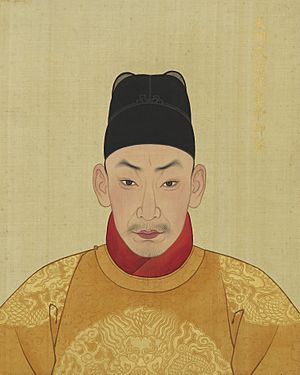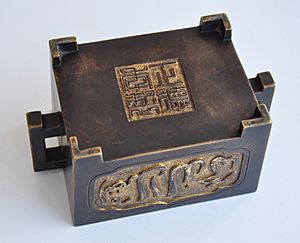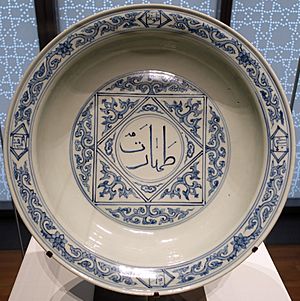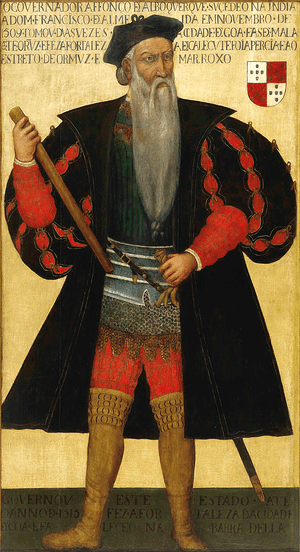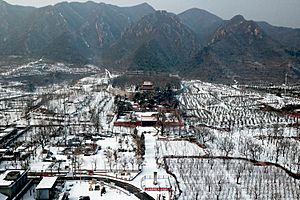Zhengde Emperor facts for kids
Quick facts for kids Zhengde Emperor正德帝 |
|||||||||||||||||
|---|---|---|---|---|---|---|---|---|---|---|---|---|---|---|---|---|---|
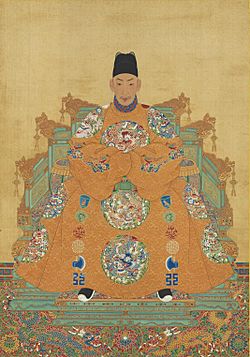
|
|||||||||||||||||
| 11th Emperor of the Ming dynasty | |||||||||||||||||
| Reign | 19 June 1505 – 20 April 1521 | ||||||||||||||||
| Enthronement | 19 June 1505 | ||||||||||||||||
| Predecessor | Hongzhi Emperor | ||||||||||||||||
| Successor | Jiajing Emperor | ||||||||||||||||
| Born | 26 October 1491 Hongzhi 4, 24th day of the 9th month (弘治四年九月二十四日) Shuntian Prefecture, North Zhili (present-day Beijing) |
||||||||||||||||
| Died | 20 April 1521 (aged 29) Zhengde 16, 14th day of the 3rd month (正德十六年三月十四日) Bao Fang |
||||||||||||||||
| Burial | Kangling Mausoleum, Ming tombs, Beijing | ||||||||||||||||
| Consorts | Empress Xiaojingyi | ||||||||||||||||
|
|||||||||||||||||
| House | House of Zhu | ||||||||||||||||
| Dynasty | Ming dynasty | ||||||||||||||||
| Father | Hongzhi Emperor | ||||||||||||||||
| Mother | Empress Xiaochengjing | ||||||||||||||||
The Zhengde Emperor (Chinese: 正德帝; pinyin: Zhèngdé Dì; 26 October 1491 – 20 April 1521) was the 11th Emperor of the Ming dynasty. He ruled from 1505 to 1521.
Born Zhu Houzhao, he was the oldest son of the Hongzhi Emperor. Zhu Houzhao became emperor at just 14 years old. His era name, Zhengde, means "right virtue." He was known for trusting eunuchs, especially Liu Jin. He passed away at age 29 from an illness. He had no sons, so his cousin, Zhu Houcong, became the next emperor.
Contents
Becoming Emperor: Early Life and Education
Zhu Houzhao was named crown prince when he was very young. His father, the Hongzhi Emperor, had no other children. This meant Zhu did not have to compete with other princes for the throne. His younger brother had passed away as a baby.
The young prince received a thorough education. He studied Confucian literature and did very well in his lessons. Many of his father's ministers believed Zhu Houzhao would become a kind and wise emperor. They hoped he would be like his father.
Zhengde's Rule: Challenges and Changes
Zhu Houzhao became the Zhengde Emperor and married his Empress at age 14. Unlike his father, the Zhengde Emperor was not very interested in ruling. He often ignored important government matters. Many people thought his actions were careless or strange. He showed a lack of responsibility many times.
The Zhengde Emperor enjoyed a very lavish and expensive lifestyle.
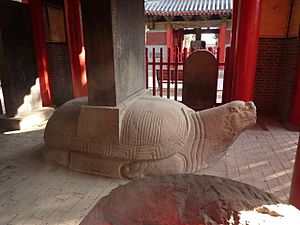
For months, he would live outside the Forbidden City. He also traveled around the country. These trips cost the Ming government a lot of money. Ministers asked him to return to the palace and handle state affairs. However, the Zhengde Emperor would refuse to meet them. He ignored all their requests.
He also allowed eunuchs around him to gain a lot of power. One eunuch, Liu Jin, was especially famous. He was the leader of a group called the Eight Tigers. Liu Jin took advantage of the young emperor. He wasted huge amounts of silver and valuable items. The money he took was about 36 million pounds of gold and silver. There were even rumors that Liu Jin planned to harm the emperor. He wanted to put his own grandnephew on the throne. Liu Jin's plot was found out, and he was executed in 1510. However, other powerful eunuchs continued to rise during the Zhengde Emperor's rule.
There were also two major uprisings during his reign. One was led by the Prince of Anhua. The other was led by the Prince of Ning. The Prince of Anhua was the Zhengde Emperor's great-granduncle. The Prince of Ning was his granduncle.
Over time, the Zhengde Emperor became known for his unusual behavior. He also used his power as emperor in strange ways. For example, he built a fake market district inside his palace. He ordered his ministers, eunuchs, soldiers, and servants to pretend to be merchants or street vendors. He would then walk through, pretending to be a common person. Anyone who refused, especially the ministers, would be punished. Ministers thought this was disrespectful.
In 1517, the Zhengde Emperor gave himself a new name, Zhu Shou. He did this so he could leave his imperial duties. He went on a trip to the north. His goal was to fight against raiding groups led by Dayan Khan. He met the enemy outside the city of Yingzhou. He defeated them in a big battle by surrounding them. After this battle, the Mongols did not raid Ming territory for a long time.
Then in 1519, the Zhengde Emperor led another trip. This time he went to Jiangxi province in the south. He wanted to stop the Prince of Ning rebellion. This powerful prince, Zhu Chenhao, had bribed many people in the emperor's government. The emperor arrived only to find that the revolt had already been stopped. Wang Yangming, a local officer, had put it down. The Zhengde Emperor was upset he could not lead his troops to victory. His advisor suggested they release the prince to capture him again. In January 1521, the Zhengde Emperor had the rebel Prince of Ning executed. This event was even written about by the Portuguese visitors to China.
Emperor's Connections with Muslims
The Zhengde Emperor was interested in people from other countries. He invited many Muslims to work as advisors, eunuchs, and representatives in his court. Artworks from his time, like porcelain, had Islamic writing in Arabic or Persian.
A travel book called Khataynameh was written by a merchant from Central Asia. His name was ʿAli Akbar Khata'i. He wrote that there was a large mosque in Beijing. He also said the Emperor used to visit and pray there.
An order against killing pigs led to some ideas that the Zhengde Emperor might have followed Islam. This was because he used Muslim eunuchs. These eunuchs ordered porcelain with Persian and Arabic writing. It is not known who truly made the order against pig slaughter.
Mysterious Events: The Dark Affliction
Before the Zhengde Emperor passed away in early 1521, strange stories spread in the capital city. People talked about a mysterious group of creatures called Dark Afflictions (Chinese: 黑眚; pinyin: Hēi Shěng). Their attacks caused a lot of worry. They would randomly attack people at night, leaving claw marks. The Minister for War asked the emperor to issue an official order. This order said that local security troops would arrest anyone who scared others. This threat quickly stopped the spread of these stories.
First European Contacts with China
The first direct meetings between Europeans and China happened during the Zhengde Emperor's rule. Afonso de Albuquerque from Portuguese Malacca sent several early missions. Portuguese explorers Jorge Álvares and Rafael Perestrello landed in southern China. They traded with Chinese merchants in Tuen Mun and Guangzhou.
In 1513, the King of Portugal, Manuel I of Portugal, sent Fernão Pires de Andrade and Tomé Pires. Their goal was to officially start relations between Beijing and Lisbon, Portugal's capital. The Zhengde Emperor gave his approval to the Portuguese ambassador in May 1520. However, the emperor died soon after. The Portuguese were said to be causing trouble in Canton. So, Chinese officials under the new Grand Secretary Yang Tinghe forced them out.
Even though illegal trade continued, official relations did not get better until the 1540s. Eventually, in 1557, the Ming court allowed Portugal to set up Macau as their trading base in China.
China and Malacca Team Up Against Portugal
The Malay Malacca Sultanate was a friendly state to Ming China. Malacca also paid tribute to China. When Portugal took over Malacca in 1511, they treated the Malay Sultanate very badly. China reacted strongly against Portugal.
The Ming government put many Portuguese representatives in prison. They were also tortured in Guangzhou. The people of Malacca had told the Chinese about Portugal taking over Malacca. Because of this, the Chinese were unfriendly to the Portuguese when they arrived in China. The Malaccans told the Chinese that the Portuguese were tricky. They pretended to only want to trade, but they really wanted to conquer land. They also told about all the bad things the Portuguese had done.
The Sultan of Malacca complained to the Zhengde Emperor about the Portuguese invasion. This, along with Portuguese bad behavior in China, led the Chinese to execute 23 Portuguese. They tortured the rest in jails. After the Portuguese set up trading posts and acted like pirates in China, the Chinese completely removed them from Ningbo and Quanzhou. Pires, a Portuguese trade representative, was among those who died in Chinese prisons.
The Chinese defeated a Portuguese fleet in 1521 at the Battle of Tunmen. They killed and captured so many Portuguese. The Portuguese had to leave their ships and escape with only three ships. They only got back to Malacca because a strong wind scattered the Chinese ships.
The Chinese held the Portuguese ambassador as a hostage. They used him to demand that the Portuguese give the Malaccan Sultan his throne back.
The Chinese then executed several Portuguese. The other Portuguese prisoners were put in iron chains. The Chinese took all the property and goods from the Pires embassy.
In 1522, Martim Afonso de Merlo Coutinho led another Portuguese fleet. It was sent to try and make peace. The Chinese defeated Coutinho's ships at the Battle of Shancaowan. Many Portuguese were captured, and ships were destroyed. The Portuguese had to retreat to Malacca.
The Chinese made Pires write letters for them. These letters demanded that the Portuguese put the deposed Malaccan Sultan back on his throne. The Malay ambassador to China was to deliver the letter.
The Chinese sent a message to the deposed Sultan of Malacca about the Portuguese ambassador. The Chinese were holding him prisoner. When they received the Sultan's reply, the Chinese officials then executed the Portuguese ambassador. The Portuguese were executed in public in different parts of Guangzhou. The Chinese did this to show that the Portuguese were not important to them. When more Portuguese ships landed and were captured by the Chinese, they were also executed.
The Emperor's Passing
The Zhengde Emperor passed away in 1521. He was 29 years old. One day in the fall of 1520, he was on a boat on a lake. He fell off and almost drowned. He became ill from the water in the Grand Canal and died later. He had several children, but none of them lived past childhood. So, his cousin, Zhu Houcong, became the next emperor. He is known as the Jiajing Emperor. The Zhengde Emperor's tomb is at Kangling, part of the Ming tombs.
What People Remember About His Rule

Some historians say that the Zhengde Emperor was trained to be a good ruler. However, he did not do his duties well. This started a difficult trend for future Ming emperors. When emperors ignored their official duties, powerful eunuchs gained control. This eventually caused problems for the Ming dynasty.
The Ming scholar Tan Qian said that the Emperor was smart and playful. He also did not harm officials who disagreed with him. He had the support of his ministers and efficient clerks. He worked late to issue orders that punished criminals like Liu Jin.
Some modern historians see his rule differently. They argue that his actions, and those of later emperors, were a reaction to problems in the Ming government. Emperors had limited power to make big changes. They faced constant pressure and were blamed for all the dynasty's troubles. As a result, some emperors became frustrated. They protested by not showing up for court. This is why emperors like Zhengde would leave the palace. Other writers say Zhengde was a strong ruler. He dealt firmly with Liu Jin, Prince Ning, and the Mongol threat. He also handled natural disasters and collected taxes fairly. While his officials helped a lot, these achievements also showed his own abilities.
Family Life
Consorts:
- Empress Xiaojingyi, from the Xia family (孝靜毅皇后 夏氏; 1492–1535)
- Consort Shuhuide, from the Wu family (淑惠德妃 吳氏; d. 1539)
- Consort Rongshuxian, from the Shen family (榮淑賢妃 沈氏; 1492–1542)
- Consort, from the Wang family (妃 王氏)
- Beauty, from the Liu family (美人 劉氏)
- Wang Mantang (王满堂); 1471 – 1541)
- Lady, from the Ma family (馬氏)
- Lady, from the Dai family (戴氏)
- Lady, from the Du family (杜氏)
See also
 In Spanish: Zhengde para niños
In Spanish: Zhengde para niños
- Family tree of Chinese monarchs (late)
- Zhengde Tongbao
 | Kyle Baker |
 | Joseph Yoakum |
 | Laura Wheeler Waring |
 | Henry Ossawa Tanner |


